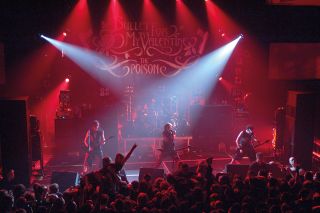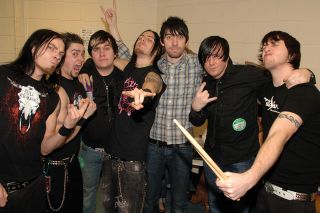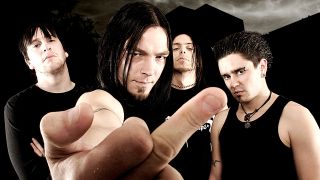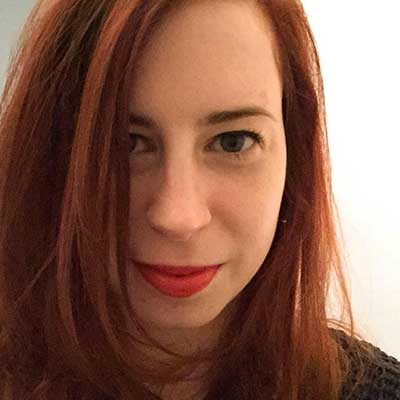At the beginning of 2005, four young boyos from south Wales were about to shoot to success. The climate in our world was changing – nu metal was on its way out and a new clutch of bands were taking classic twin guitar harmonies and giving them a 21st century update. In America, Killswitch Engage had just released The End Of Heartache – their most successful album yet, and first with imposing new singer Howard Jones. Meanwhile, Trivium had been in the studio working on their breakthrough album, Ascendancy. Meanwhile, in Bridgend, Bullet For My Valentine were newly signed, and about to start work on their first record – The Poison.
It had been a long time coming. After years plugging away in the underground as Jeff Killed John, vocalist/guitarist Matt Tuck, lead guitarist Michael ‘Padge’ Paget and Michael ‘Moose’ Thomas had knocked the band on the head and formed Bullet instead, recruiting Jason ‘Jay’ James on bass. After signing a five-album deal with Sony, 2004 had been a whirlwind, seeing them tour in support of bands such as Anthrax and 36 Crazyfists, as well as playing Download and releasing a five-track EP. Still, as the clock struck midnight on New Year, with the boys celebrating at the houses of their friends and family in Bridgend, they had no idea where their journey would take them next.
In the candid words of Matt and Padge, this is the story of how The Poison turned Bullet into Britain’s brightest hopes, defining metalcore for a generation and setting them on the path to international success.
In March 2005, Bullet were set to go into the studio with renowned metal producer Colin Richardson. They had given up their jobs to pursue their dreams, and their hunger was combined with a sense of nervous anticipation.
Matt Tuck: “I had been working in a record store, Jay was working as a cinema projectionist, Padge was in a factory making wheelchairs and crutches, and Moose was unemployed. We held off quitting until the last moment. We were all in shitty jobs, so it wasn’t a problem, but it was a big move because of the uncertainty.”
Michael ‘Padge’ Paget: “Quitting was a nice feeling. I had all the crappest jobs in the world – everything from folding jeans in Levi’s, to being a service boy in an upholstery factory. On my last day, I went straight to the tattoo shop and got myself a big piece. But it was also really difficult times, because I had my first mortgage. Going from decent pay to nothing, I really struggled. And I remember my dad coming down to the house and giving me a cheque to cover my mortgage for two months, and getting all upset and thanking him.”
Matt: “I had a back-up plan until I was 17 – I wanted to be a rugby player and played at a regional level. But the music took over, and I started drinking and smoking and going to heavy metal shows. And that was it.”
Decamping to the residential Chapel Studios in rural Lincolnshire, the foursome launched themselves into making the album, recording by day and piecing together last-minute songs at night.
Matt: “It was the same studio where Machine Head made The More Things Change… with Colin [in 1997], so to have those conversations with Colin at the time, and to be in the same room I saw on a Headbanger’s Ball special, was very exciting. It was all those sprinkly magic moments.”
Padge: “Up until then, everything was cheaply done. But this was the real deal – we had budget from the label, we were in a world-class studio, and we were away from home. It was crazy, mental times. Although it was fun, it was really stressful as well.”
Matt: “A lot of the album was actually made there, while we were going along. We kinda lied… we told the label that we had enough songs, but we only had about four – All These Things I Hate (Revolve Around Me), Tears Don’t Fall, 4 Words (To Choke Upon), a bit of Her Voice Resides, and a bit of Hit The Floor, an old Jeff Killed John demo.”
Padge: “They’d serve up food about 7 o’clock at night, and then we’d crack open the beers, start playing pool, get the acoustic out and throw some ideas around. I think that’s how a lot of songs are written, when you’re not pressured.”

But Bullet’s harmonious routine was disrupted when the label asked them to fly to Canada to work on possible singles with super-producer GGGarth Richardson, who had helmed Rage Against The Machine’s debut in 1992. The sessions did not go well.
Padge: “It was exciting times, because I’d never been to America or Canada in my life. But when we got there, we were all super-shy, just little young boys out of our comfort zone.”
Matt: “Garth is a lovely guy, but his vision wasn’t for us. He was making us record with the engineers, then he’d take it and fuck with it, and then play it back and have all these crazy delays on the vocals. I don’t know whether he was smoking too much weed at the time, but it just wasn’t working. We were basically left there to fend for ourselves as well. We didn’t have a car, him and his staff were living in this huge house, and we were in this shed in the back garden.”
Padge: “We started to run out of money, and we were eating a boiled egg a day. There was no budget for food. Garth was taking our songs to a completely different place. It was like, ‘What are you doing? This is our baby!’ So it started unfolding pretty bad. Tensions were high because everybody was hungry and away from home.”
Matt: “We listened back to the tracks, and your ears don’t lie. It’s like, ‘Why are we doing something which is 10 times shittier but, costing 10 times more?’ Everyone’s heads were dropping, and it was scary as fuck, because we thought we might not have a say in it. We all came home with our heads in our hands on the plane, running to Colin almost in tears.”
Colin Richardson (producer): “It was just label stuff, so there was no point in me throwing my toys out of the pram. But maybe secretly I was really pleased when they came back – ‘Colin, we need to finish them off with you, it’s a disaster!’”
- Bullet For My Valentine: "Trust your instincts and ignore the haters"
- Bullet For My Valentine to play debut album The Poison in full
- Bullet For My Valentine: We'll never do a Bring Me The Horizon
- Bullet For My Valentine announce new single Don't Need You
Bullet took up with Colin again to finish the record, and they spent a week with Andy Sneap, but time was against them. After a month in Canada, they now had to balance recording commitments with touring as support to Funeral For A Friend. Excitement levels were high, but the pressure was on. The Poison would end up costing half a million dollars.
Matt: “We were taking on a lot at the time. Singing in a booth for four hours sounds easy, but it’s really fucking hard. Some of the vocal parts were so angry and pissed off and excited that I pushed like crazy to get this aggressive performance out. There were some spinny, pass-out moments. And I felt rotten, and had panic attacks. When we recorded the intro scream on Tears Don’t Fall, I did actually pass out. On the take, you can hear a scream, and then this dropping body.”
Colin: “It was the famous, ‘Let’s Go!’ at the beginning. We went into the studio, and he was laying on the floor passed out. We shook him a little, and he went, ‘I feel terrible, I think I’m gonna be sick.’ So that was one hell of a scream!”
Matt: “I went to hospital for a quick check, to put my mind at ease. And it was more psychological than physical – you get a bit scared, and then you get back in the booth and think, ‘Oh, it’s going to happen again.’ It starts to fuck with you a bit. When I was worrying, I was increasing my heart rate, which was making me panic more. I needed to man up.”
Padge: “I didn’t know he was having panic attacks. He’s a really quiet guy. It’s hard to talk to him – he keeps a lot of things locked away, and he doesn’t open up a lot. He’s always been like that.”
Matt: “I’d never been in a situation in life to have anxiety. It was just getting all this done. You start to get these pressures – starting to get into the public eye, and the metal world. There was anticipation for the record, and I wanted it to be the best.”

Aside from private stresses and strains, Bullet were finally making their mark. They played Metal Hammer’s Golden Gods in June 2005, and behind closed doors they put the finishing touches to the songs that would change their lives forever.
Matt: “Tears… is such a weird song. It’s got so many elements to it, and so many tempo changes, and it’s very dynamic. I remember listening back to the first demo vocal, and everyone was like, ‘This is it. This is the song that’s going to take everyone to the next level.’”
Padge: “Looking into the producers’ faces and our A&R guy at the time, we knew we were onto something. You could see him counting the money in his eyes! It was a really nice moment, knowing we were doing something that would benefit our career.”
Matt: “I’d just come out of a four-year relationship before the band started to make the EP, and I’d always had a really vivid imagination, so I used these situations that pissed me off or broke my heart, and made them into the most bold, over-the-top, ridiculously colourful lyrics. I didn’t have any inhibitions, because we didn’t really have a fanbase. Tears… was the turning point for me becoming a songwriter, because I started to think about what I was saying. A song like The End is really twisted. When we were writing it, I remember sitting with the boys and going, ‘Is this too weird?’ It’s about how the fingernails that used to scrape my back are now buried in earth, and all this shit! It’s like a movie, really.”
Padge: “I like a lot of Matt’s lyrics, but with a lot of the other stuff it’s like, ‘Ooh, stop being so girly!’”
The Poison was released on October 3, 2005, and went to Number 21 in the UK Top 40 – a big deal for a young metal band. Bullet completed a victory lap, including a hometown show at Cardiff’s Coal Exchange, and a date at London’s Astoria. An even bigger tour followed in January, culminating in Brixton Academy. They had made it.
Matt: “I’m not gonna lie, we absolutely knew we had written something special. There was not a band that sounded like us. The metal scene had turned with Killswitch, and there was Avenged Sevenfold and Trivium. There was a new breed of fucking dog in town, and we were the British representatives. It didn’t really stop from there. America happened, and then Metallica got on the phone, and then Axl. It was bizarre.”
Padge: “Doing Cardiff was so good. Because it wasn’t long after I left work, so I was in touch with one of the boys from work, and he was friends with my boss. They were all having a laugh and a joke – ‘Oh, you’re going off to be the big rock star’, and this and that. I put them on the guestlist and met them after the show. They were like, ‘What the fuck is going on?’ And I was like, ‘Fucking told you.’ It was nice, because they never believed me, so it was just in your face, really – have that!”
Matt: “The night before the Astoria, I’d pulled a muscle in my neck. I ended up getting this muscle relaxant shot in my ass. For some reason, I thought it was a good idea to tell the crowd!”
Padge: “Brixton was the scariest gig, because we were being filmed. I walked downstairs, had a big swallow, and played my heart out. Playing The Poison there again is going to be strange – it’s going to be like time-travelling.”
Matt: “It’s going to be a bit of a moment, I think. It’s an era for us and it literally changed our lives. When we play that intro in that venue, I think there’s going to be a couple of tears.”
Padge: “I won’t shed any tears. Maybe some of the emos in the front row will! But it’s been a hell of a ride.”
Bullet For My Valentine's new album is out this year. The band play Download festival in June.




